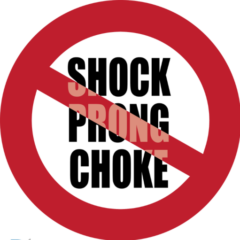DOES THE TRAINER USE THE WORD “CANINE” OR “K9” IN THEIR BUSINESS NAME?
“Canine” and “K9” are often associated with businesses run by trainers who train dogs with the old aversive training methods taught decades ago. These words are often, but not always, a tip off that the trainer has much of their experience with working breed dogs like German Shepherd Dogs or Belgian Malinois.
Training military and police dogs for protection work often involves the use of choke, prong, and shock collars. But training working breeds or other large breed dogs like Great Danes or Cane Corsos is NOT the same as training small toy breeds or puppies! There is ABSOLUTELY NO NEED for choke, prong, or shock collars in training small dogs or puppies. Use of these methods merely says the trainer can not cue a dog to perform a certain behavior without forcing them. If you are looking for trainer consider if you want to have a dog perform a behavior you ask for without using harm or punishment or if you plan to force your dog to obey when you get home.
DOES THE TRAINER CLAIM TO USE POSITIVE TECHNIQUES IN TRAINING?
If you see shock (e collar), prong (“pinch” collars), or choke (slip) collars on the trainer’s website then they are using positive PUNISHMENT. Taking away the punishment of shocking, pinching, or choking is a different term but if the trainer doesn’t know that term then they don’t have the industry valued education to safely train your dog.

The meaning of “positive” in educated dog training
A trainer’s website may say they train using “positive techniques” but if the website doesn’t specifically say “positive rewards” then there is a chance they train using positive PUNISHMENT as well.
Just like they taught you in school positive (+) means adding something. But what do you see added in the photos on the trainer’s website? Do you see the trainer adding a reward like a treat or a tug toy when the dog is sitting or do you see an added choke, prong, or shock collar around the dog’s necks?
The trainer may use rewards like treats or toys as well but trainers who use both of these methods are referred to as “balanced” trainers and the training is NOT all positive rewards. If you see collars or leashes that can choke or hurt the pet in photos on the trainer’s web site then there is a good chance the message is misleading the consumer or that the trainer really isn’t sure what they are actually teaching the dog. Why pay premium prices if the trainer doesn’t know what the difference is?
The consumer MUST find out as much as they can about their trainer. What the trainer hasn’t been educated in and doesn’t know could cause more problems in training your dog than they solve.

DOES THE TRAINER USE THE WORDS “PINCH” OR “E STIM” IN THEIR DESCRIPTION OF TOOLS?
To soften the blow of harsh sounding words and make it sound like certain tools don’t hurt your dog trainers often use alternative words. Herm Sprenger, StarMark, and other prong collars that have spikes or prongs that poke inward onto your sensitive dog’s neck and are often referred to as “pinch” collars by some trainers to justify their use.
Electronic collars also known as “e collars” can sometimes be referred to as “E stim” or feeling like a TENS unit. No matter how the trainer markets the word these collars will deliver a shock to your pet which can vary from startling (beep at their neck) to painful (depending on the level of shock.) There is no place for fear in learning. The animal is more concerned with their safety than what you are asking them to do.

No Exceptions!
There is NEVER EVER a reason to use a choke, prong, or electric shock collar on a small dog or puppy! Slip leads can be dangerous as well.

DOES THE TRAINER CLAIM TO HAVE VETERINARY RECOMMENDATIONS?
If the trainer’s online or print marketing says they are veterinarian recommended (and it wasn’t your Veterinarian doing the recommending) then be sure you ask what Veterinarians recommend the trainer. Once you find out the names of the Veterinarians who recommend the trainer then CALL them and ask what they like about the trainer enough to recommend them.
DOES THE TRAINER MENTION WINNING ANY AWARDS?
Are the awards professional ones from an industry association or a local Chamber of Commerce that were earned (and confirmed on the association or Chamber’s business websites)? Or are the awards ones that can be purchased from an organization that is in the marketing business? These days you can pay to buy business reviews as well as business awards but they have nothing to do with the service quality of the business. You want to be sure you are paying for the value of education and industry support, not awards to sell you.
DO YOUR RESEARCH. THEN DECIDE IF THE TRAINER’S MARKETING GIVES YOU THE INFORMATION YOU NEED
If you are considering hiring a particular trainer then do some research on your top three candidates.
Look up the trainer’s name in the industry groups that gave them their certifications or accepted them for membership. If you are successful in verifying the trainer’s credentials and memberships (sometimes you won’t find what you expect) you will know a little more about the trainer you are considering for hire. You’ll quickly find out who is a credentialed professional and who is not.
After you’ve checked out your potential hire then meet with the trainer in person. Treat the meeting as a job interview. How do you feel about the person when you meet? You will be interacting with them during training so you need to be sure that you and your family feel comfortable with the trainer’s demeanor, training methods, and credentials.
